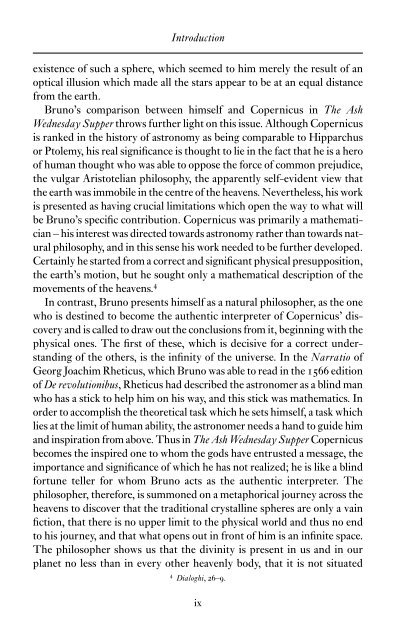You also want an ePaper? Increase the reach of your titles
YUMPU automatically turns print PDFs into web optimized ePapers that Google loves.
Introduction<br />
existence of such a sphere, which seemed to him merely the result of an<br />
optical illusion which made all the stars appear to be at an equal distance<br />
from the earth.<br />
Bruno’s comparison between himself and Copernicus in The Ash<br />
Wednesday Supper throws further light on this issue. Although Copernicus<br />
is ranked in the history of astronomy as being comparable to Hipparchus<br />
or Ptolemy, his real significance is thought to lie in the fact that he is a hero<br />
of human thought who was able to oppose the force of common prejudice,<br />
the vulgar Aristotelian philosophy, the apparently self-evident view that<br />
the earth was immobile in the centre of the heavens. Nevertheless, his work<br />
is presented as having crucial limitations which open the way to what will<br />
be Bruno’s specific contribution. Copernicus was primarily a mathematician<br />
– his interest was directed towards astronomy rather than towards natural<br />
philosophy, and in this sense his work needed to be further developed.<br />
Certainly he started from a correct and significant physical presupposition,<br />
the earth’s motion, but he sought only a mathematical description of the<br />
movements of the heavens. 4<br />
In contrast, Bruno presents himself as a natural philosopher, as the one<br />
who is destined to become the authentic interpreter of Copernicus’ discovery<br />
and is called to draw out the conclusions from it, beginning with the<br />
physical ones. The first of these, which is decisive for a correct understanding<br />
of the others, is the infinity of the universe. In the Narratio of<br />
Georg Joachim Rheticus, which Bruno was able to read in the 1566 edition<br />
of De revolutionibus, Rheticus had described the astronomer as a blind man<br />
who has a stick to help him on his way, and this stick was mathematics. In<br />
order to accomplish the theoretical task which he sets himself, a task which<br />
lies at the limit of human ability, the astronomer needs a hand to guide him<br />
and inspiration from above. Thus in The Ash Wednesday Supper Copernicus<br />
becomes the inspired one to whom the gods have entrusted a message, the<br />
importance and significance of which he has not realized; he is like a blind<br />
fortune teller for whom Bruno acts as the authentic interpreter. The<br />
philosopher, therefore, is summoned on a metaphorical journey across the<br />
heavens to discover that the traditional crystalline spheres are only a vain<br />
fiction, that there is no upper limit to the physical world and thus no end<br />
to his journey, and that what opens out in front of him is an infinite space.<br />
The philosopher shows us that the divinity is present in us and in our<br />
planet no less than in every other heavenly body, that it is not situated<br />
4 Dialoghi, 26–9.<br />
ix

















